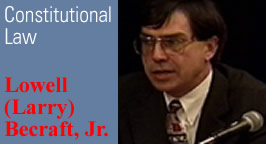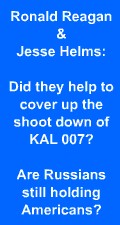Other
Becraft
Articles:
Jurisdiction Questioned,
Part 1
JURISDICTION
QUESTIONED SERIES
FDA, DEA FIND BASIS IN INTERNATIONAL
TREATIES
PART III
By
Attorney Lowell (Larry) Becraft, Jr.
July 12, 2004
NewsWithViews.com
The prior two articles in this series have discussed the constitutional basis for the establishment of the U.S. Fish & Wildlife Service and in them it was demonstrated that this agency has its origins within the federal treaty power. Are there more such agencies? How about the DEA and FDA?
Control over the possession and sale of any item within the states is not a power possessed by Congress. This was so held in United States v. DeWitt, 76 U.S. 41, 45 (1870), which tested the constitutionality of a federal revenue act making it illegal to sell illuminating oil of a certain flammability. Here, the Court held Congress did not have the power to penalize these sales:
"As a police regulation, relating exclusively to the internal trade of the States, it can only have effect where the legislative authority of Congress excludes, territorially, all state legislation, as, for example, in the District of Columbia. Within state limits, it can have no constitutional operation."
More than 40 years later, Congress enacted a federal drug law designed to make criminal the possession of contraband drugs like opium. Based upon the decision in DeWitt, the Supreme Court held in United States v. Jim Fuey Moy, 241 U.S. 394 (1916), that Congress did not have power to make penal mere possession of drugs within the states. These two cases have never been reversed, so how did we get the DEA? Like the Fish & Wildlife Service, the origins of this federal agency is also in treaties.
In 1912, the Senate adopted the International Opium Convention - see 38 Stat. 1912. Later, this convention was supplemented by a similar convention of 1913, the Multilateral Narcotics Drugs Convention, ratified on March 31, 1932, 48 Stat. 1543, which was thereafter implemented by appropriate federal legislation designed to control poppy production within this country. [Note from Devvy: this 1932 convention is null and void since it was ratified by a senate serving in office under a law that does not exist.] In Stutz v. Bureau of Narcotics, 56 F.Supp. 810, 813 (N.D.Cal. 1944), some poppy growers sought an injunction to enforcement against them of the provisions of the act implementing the convention, their argument being the act invaded the reserved powers of the Tenth Amendment. In rejecting this argument and holding that the act applied within the jurisdiction of California, the Court declared:
"The competency of the United States to enter into treaty stipulations with foreign powers designed to establish, through appropriate legislation, an internationally effective system of control over the production and distribution of habit forming drugs is not questioned. The obligations of the United States incurred as a party to the two Conventions heretofore mentioned were lawfully undertaken in the proper exercise of its treaty making power. And Congress is constitutionally empowered to enact whatever legislation is necessary and proper for carrying into execution the treaty making power of the United States."
Other cases have also noted that control over drugs by the federal government arises from these treaties - see United States v. Rodriguez-Camacho, 468 F2d. 1220 (9th Cir. 1972); and NORML v. Ingersoll, 497 F2d 654 (D.C.Cir. 1974), later opinion at 559 F2d. 735 (D.C.Cir. 1977). The jurisdiction of the DEA is therefore based upon these drug treaties and it thus has an international jurisdiction. Henry Hudson, Randy Weaver's defendant and the former head of the Marshal's Service, stated as much on his Sunday afternoon radio show in the D.C. area back in March of this year.
The power of the DEA to control "bad" drugs such as opium and cocaine is constitutionally indistinguishable from the similar power of the FDA to control other "drugs" such as Vitamin B and shark cartilage. If the DEA is a treaty-based federal agency, is it not possible that so is the FDA? As you might expect, the authority of the FDA arises from a 1906 international Agreement for Unification of Pharmacopeial Formulas for Potent Drugs.
There are other examples of treaties being used to provide jurisdiction for federal crimes. Of course, Congress completely lacks delegated authority to control prostitution within the states. However, the Agreement for Repression of Trade in White Women was ratified by the Senate on March 1, 1905 - see 35 Stat. 1979. The implementing legislation for this treaty was the White Slave Traffic Act, 36 Stat. 825. The Supreme Court has noted that this treaty provides jurisdiction to enact laws on this subject; see United States v. Portale, 235 U.S. 27 (1914). But, even with jurisdiction being based upon this treaty, there are limits to prosecutions for violations thereof and everything relating to prostitution cannot be federally controlled - see Keller v. United States, 213 U.S. 138 (1909).
In summary, it is quite clear that the U.S. Fish & Wildlife Service, DEA and FDA are treaty-based federal agencies. Under the U.S. Constitution, Congress has the power to make criminal four types of conduct: treason, counterfeiting, piracies and felonies on the high seas, and offenses against the laws of nations. Very few people discuss which precise federal crimes fall within the category of offenses against the laws of nations and it would be very beneficial if we knew which crimes were of this type. Obviously, the criminal provisions of the federal gambling laws and the federal drug laws can be but one thing: offenses against the law of nations.
� 2004 Lowell Becraft - All Rights
Reserved
Lowell (Larry) Becraft, Jr., is a constitutional
attorney based in Huntsville, Alabama, who specializes in criminal defense
cases, primarily involving the federal income tax. His legal web site
is: http://home.hiwaay.net/~becraft/
E-Mail: becraft@hiwaay.net
it is quite clear that the U.S. Fish & Wildlife Service, DEA and FDA are
treaty-based federal agencies. Under the U.S. Constitution, Congress has
the power to make criminal four types of conduct: treason, counterfeiting,
piracies and felonies on the high seas, and offenses against the laws
of nations.







